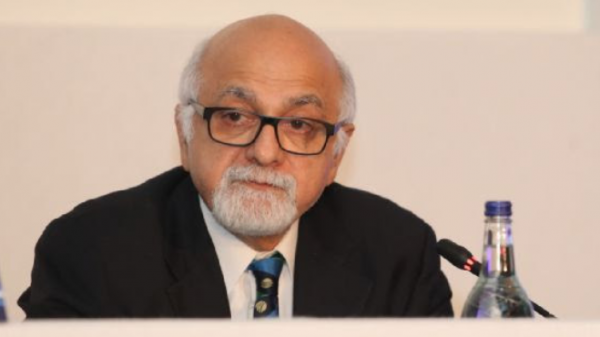Imran Khwaja made interim ICC chairman

- Update Time : Thursday, July 2, 2020
- 152 Time View

Imran Khwaja was made interim chairman of the International Cricket Council on Wednesday until fresh elections for the post is held.
The decision was taken by the ICC Board on Wednesday after incumbent chairman Shashank Manohar of India stepped down from the post after completing his two terms.
Khwaja, who is a former president of the Singapore Cricket Association, was elected as ICC’s deputy chairman in 2017, a year after Manohar became the global cricket body’s inaugural independent chairman, said a ESPN.Cricinfo report
The deputy chairman’s position was part of the new ICC constitution which came into effect from 2017. That constitution was drafted by a five-person working group which included Khwaja.
A lawyer by profession, Khwaja, 64, has been an ever-present but little-heard figure – publicly at least.
He remains, however, a powerful voice on the ICC Board and is part of a number of influential committees. Currently, the committees Khwaja sits on include the Finance & Commercial Affairs, Nominations, Development (chair) and Membership.
It was Khwaja who played a significant role in convincing Manohar to continue as ICC chairman in 2017 after the former BCCI president had opted to step down even before finishing a year in the post. Although he is the chairman of Associates, Khwaja has had a say in significant reforms the ICC carried out under Manohar’s leadership, including the overhaul of the governance structure, the finance model and creating a democratic structure at the ICC board where even the smaller countries have had a say.
In the media release on Wednesday(June 1) the ICC said that the Board would finalise the nomination process to elect Manohar’s full-time successor “within the next week”.
Normally the new chair would have been installed at the ICC’s annual conference, which this year is believed to have been postponed indefinitely due to the Covid-19 pandemic, although the annual general meeting will still take place virtually.
Khwaja, along with the outgoing ECB chairman Colin Grave, has been talked about as the frontrunner to replace Manohar on a full-time basis, although neither has made their desire to contest public.
Also in the reckoning could be BCCI president Sourav Ganguly, who became eligible after he participated in his first ICC Board meeting this March. A fellow ICC Director said that Ganguly brought good cricketing arguments to the Board which has traditionally been populated by administrators who have not played the game.
The BCCI has been actively looking for support for Ganguly, although the former India captain has not made his intention known either in public or within BCCI circles.
Former South Africa captain Graeme Smith, now director of cricket at Cricket South Africa, said global cricket needed a “strong leadership” which Ganguly was “best positioned” to provide.
Hours after Smith made his comments, CSA president Chris Nenzani said the South African board did not want to “anticipate any candidates to be nominated” until the process was finalised.
Over the last couple of months, a number of board heads have had their name attached to the chairmanship, though none have said anything of their intentions publicly and the process for how they are elected has not even been finalised.
The latest hat in the ring has been thrown by Dave Cameron, former president of Cricket West Indies (CWI). Cameron, who lost the CWI presidency to Ricky Skerritt in 2019, has been recommended by the United States Cricket Hall of Fame. Cameron has been lobbying for support in the Caribbean and has at least one backer in Conde Riley, the president of Barbados Cricket Association, who also sits on the CWI Board. Kishore Shallow, the CWI vice-president, said that he would not support Cameron, but said that was his personal decision, and a final decision would be taken by Skerritt.
The ICC last held elections for the chairman’s position in 2016, when Manohar was elected through a secret ballot.
In 2018, Manohar retained his position for a second term having been elected unopposed as the sole candidate. To be eligible, the candidate needs to be either a present or past ICC Director – one who attends at least one ICC Board meeting – and has to be nominated by one current ICC Director. Nominees with the support of two or more Directors are eligible to contest an election















